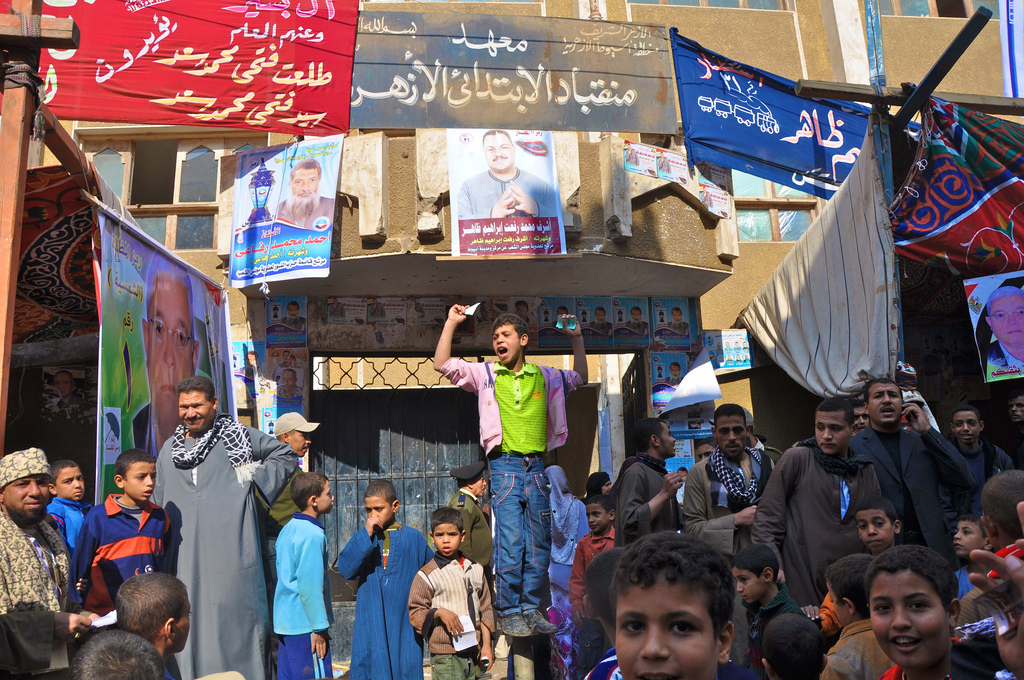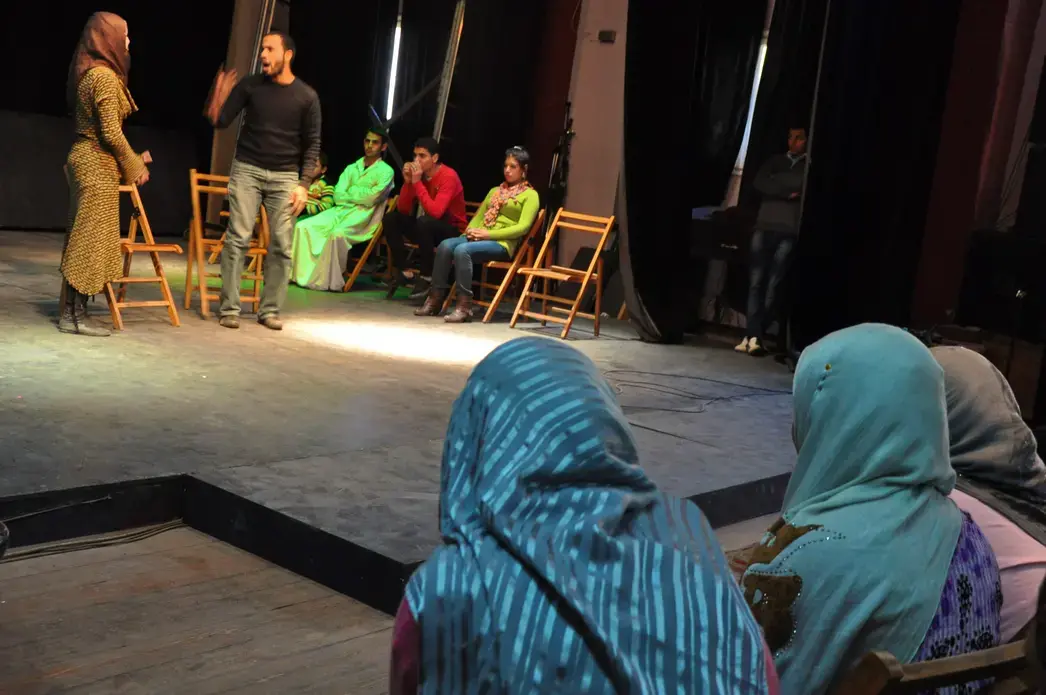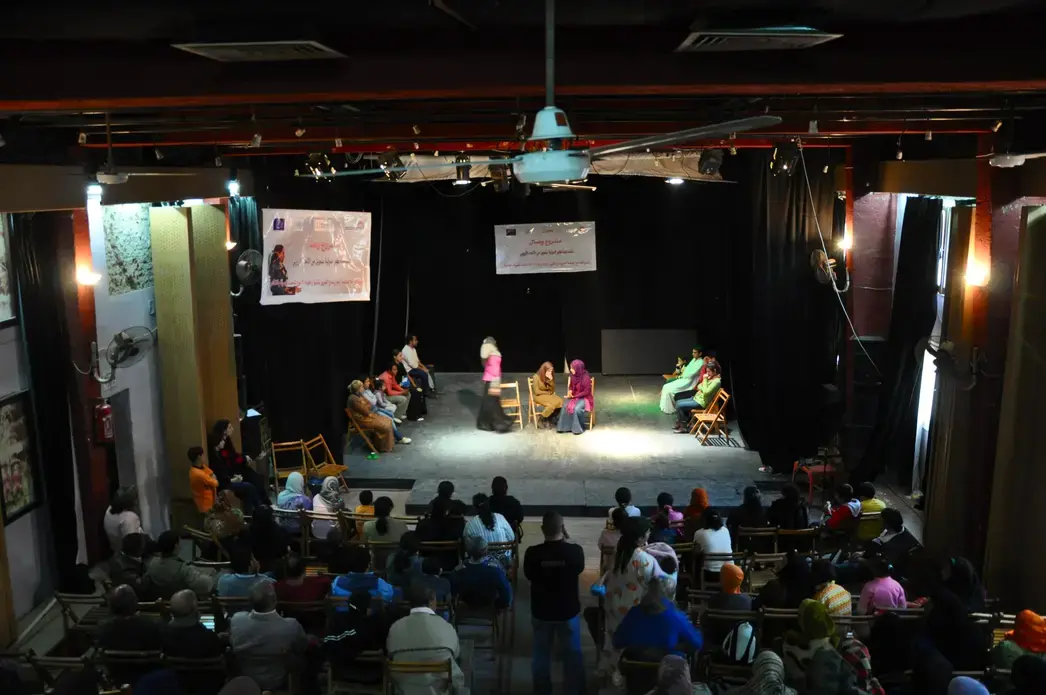On one sweltering afternoon 150 miles south of Cairo, 21-year-old Amina (her name has been changed to conceal her identity) stood stage right in a dim, run-down theater. Looking out to everyone in the audience and no one in particular, tears streamed down her cheeks as a fellow actor, playing her abusive husband, lunged violently toward her. A thick silence swept across the dusty, makeshift auditorium, though the audience members didn't avert their eyes. For most of them, it was a mere flashback or premonition hanging above their heads, hovering over them constantly.
In chaotic post-uprising Egypt, activists have only begun lifting the lid on the country's sexual-harassment pandemic, but numbers chart yet another systemic form of violence against women that has yet to make headlines.
According to a 2009 study by the Nadeem Center for Rehabilitation of Victims of Violence, 79 percent of Egyptian women said they had personally experienced domestic violence. A national study conducted in 2005 showed one out of every three married (or previously married) women has been beaten at least once by her husband. Among those beaten, fewer than half ever sought help.
In Egypt's neglected countryside of Minya, a small theater company has decided to break the silence and take matters into its own hands. Recognizing the issue is too taboo to address point-blank, a team of around 20 volunteer actors in the Jesuit Theatre Company has used domestic-violence themed plays to broach the issue in nearby villages. While the area is known for its sectarian tensions, the cast is made up of both Christians and Muslims. Most of the actors are women. Several are abuse victims themselves.
Through interactive theater, the company encourages audience members to take the stage, role-play, and problem-solve their way through dynamics that are all too familiar: an abusive father forcing his daughter into an early marriage to a man she loathes; a violent mother-in-law who hates her son's second wife because she only bears girls, unlike his beloved boy-producing first wife; an unemployed husband who takes his frustration out on his helpless wife.
"I didn't need much practice for this role," said 23-year-old Eman, who plays an abusive mother-in-law. "I've just watched my own mother's experience."
The whole cast seems heavy with stories they're carrying—ones they're torn between hiding and sharing. Eman's best friend, 21-year-old Nermine, recounts how her math teacher used to abuse her in private-tutoring sessions when she didn't get the answers right. "I hate math," she said. "Numbers still give me chills."
The power Amina exudes on stage while playing the abused wife unravels easily into sheer vulnerability when out of character. She bites her henna-inked nails and talks with a slow stutter as she recalls a childhood marred by a family member who she says abused her. She alludes to sexual abuse, though quickly bounces to another subject.
"Most of my family still doesn't know," she said. "I can't tell them. The whole family would be shamed." She says she wants to help others through the theater, but really she's trying to help herself.
While the homegrown rural theater company has received mostly applause, its popularity is hardly unanimous. The members said they've been spat on and yelled at by some men, and even women.
Upper Egypt, where Minya is located, is considered the most culturally conservative and traditional area of the country, where ingrained patriarchal values continue to inform attitudes and world views. While the region accounts for only 40 percent of the national population, according to a 2012 World Bank report, it houses 60 percent of those living in poverty and 80 percent of those living in severe poverty.
Most of the volunteer actors in the small theater company have never protested in the famed Tahrir Square; some of them have only traveled to Cairo once or twice.
"This is risky for us," said Adel Makram, the 52-year-old theater director. "No one is really addressing this in Cairo, and certainly not down here. But to me, this is real revolution. When you revolt in a square, people next to you have a certain level of knowledge…but on the stage, you can reach the people you can't in a square."
A political will to address systemic violence against women in Egypt is almost nonexistent. Though grassroots campaigns against sexual harassment have dominated headlines both domestically and internationally, politicians have not only failed to acknowledge the issue, but have often denied the problem exists.
In an interview last year, a female Muslim Brotherhood parliamentarian told me she doesn't believe sexual harassment exists because she's walked home at 2 a.m. and has never been assaulted.
The Nadeem Center has been collecting signatures to introduce legislation that would criminalize domestic violence. Similarly, Egypt's National Council for Women recently proposed a new law that would criminalize sexual harassment with a minimum sentence of a year in jail for first-time offenders. Eighty-three percent of Egyptian women say they have experienced sexual harassment, according to a 2008 survey by the Egyptian Center for Women's Rights.
"At the moment, sexual harassment is the sexy issue to deal with, while domestic violence is still in the closet in Egypt," said Sally Zohney, a tireless activist and associate at U.N. Women Egypt. "It's a harder issue to fight, but we need to start the conversation on domestic violence right now."
Amani Khalil, a councilor at the Nadeem Center, says while there's an uptick in women seeking help, many are still afraid to come forward. "The problem is cultural. This is a country where women are taught from a young age to make and bring tea to their fathers and brothers. You don't talk about these things, especially if they happen in your family."
While ousted president Hosni Mubarak's sclerotic regime did little to advance women's rights, many fear Egypt's new government, led by a party affiliated with the Muslim Brotherhood, may do even less, if not try silence the fight.
When the U.N.'s Commission on the Status of Women proposed a declaration in March condemning violence toward women, the Muslim Brotherhood shortly after denounced the declaration for "contradicting established principles of Islam, undermining Islamic ethics, and destroying the family, the basic building block of society." Recently, the upper house of Egypt's contested Parliament's Committee on Human Rights again lambasted the declaration, arguing it would promote abortion, homosexuality, and promiscuity.
Back in Minya, Umm Ali, 27, watched one of the plays passively while she balanced a nursing baby and another son fast asleep on her lap. "For me, I identify more with the abusive mother-in-law," she said, her clothes tattered and face pockmarked like a pumice stone. "When you are beaten, you turn into the beater."
The audience trickled out of the theater, half laughing and half grimacing in self-recognition before they walked back outside into Egypt's dusty landscape of dismal opportunities and dimmed aspirations. Backstage, Makram, the theater director, sat in his nicotine-hazed office, figuring out what other villages to reach out to next, where else art can imitate and—just maybe—alter life. "This is our form of revolting," he said. "I'm just trying to throw a stone in a pond and see how much it ripples."








